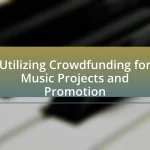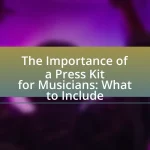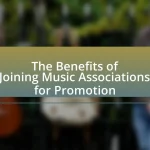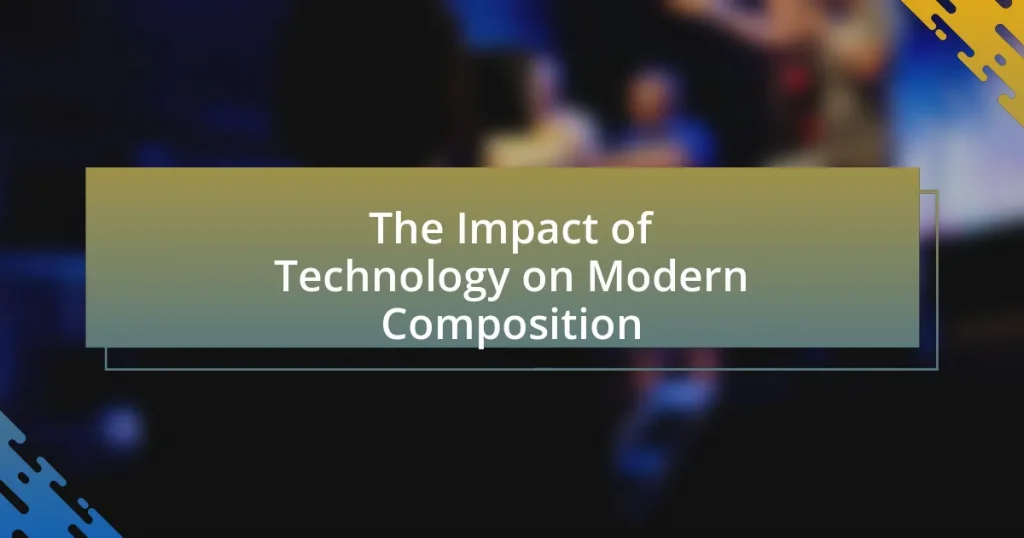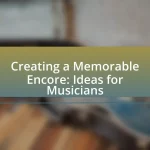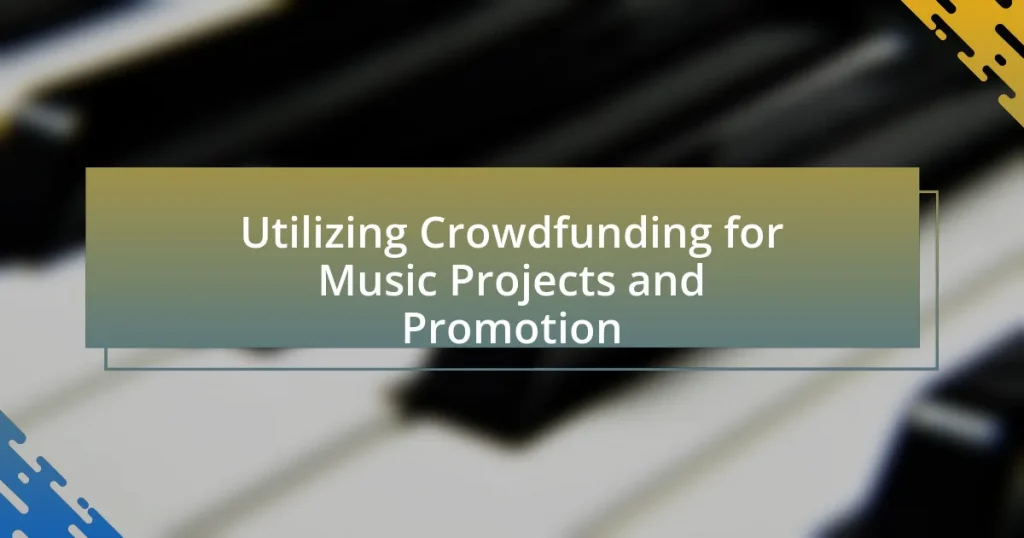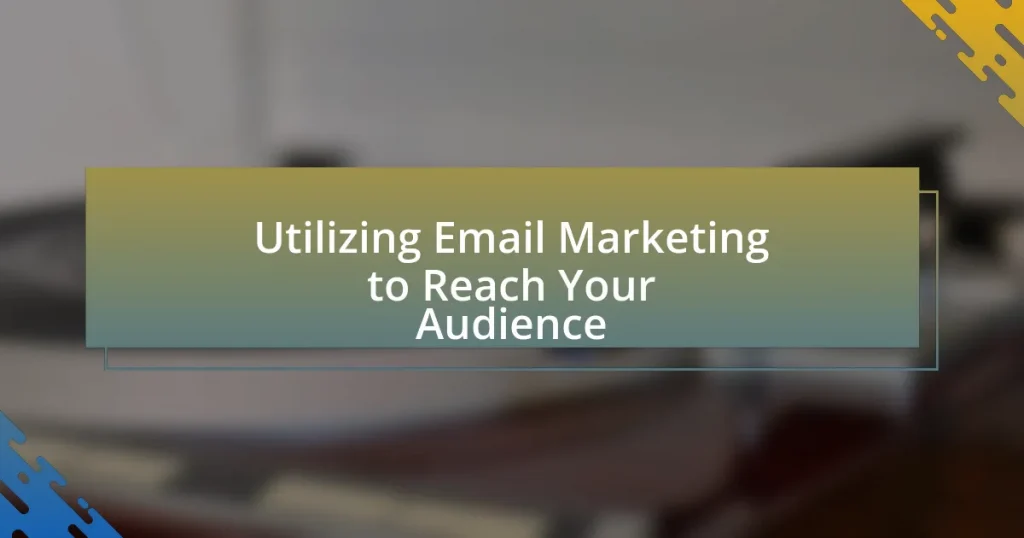The article examines the significant impact of technology on modern composition, highlighting how digital tools have transformed the creation, sharing, and consumption of written and musical content. It discusses the advantages of technology, such as enhanced collaboration, increased efficiency, and improved accessibility, while also addressing challenges like over-reliance on digital tools and ethical considerations regarding authorship and originality. Key tools and software used in contemporary composition, along with strategies for integrating technology effectively, are also explored, providing insights into how composers can balance traditional techniques with modern advancements.
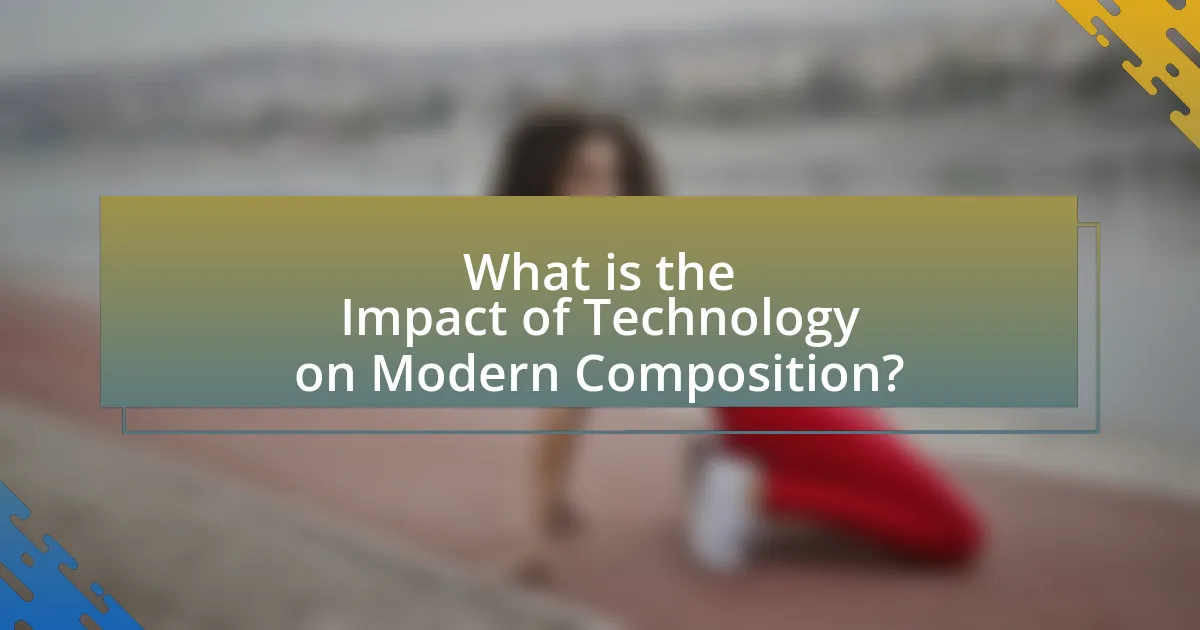
What is the Impact of Technology on Modern Composition?
The impact of technology on modern composition is profound, as it has transformed the way individuals create, share, and consume written content. Digital tools such as word processors, collaborative platforms, and online publishing have streamlined the writing process, allowing for real-time editing and feedback. For instance, Google Docs enables multiple users to collaborate simultaneously, enhancing productivity and creativity. Furthermore, technology facilitates access to a vast array of resources, including research databases and writing aids, which support the composition process. According to a study by the Pew Research Center, 87% of teachers believe that technology has a positive impact on student writing, highlighting its role in improving writing skills and engagement.
How has technology transformed the process of composition?
Technology has transformed the process of composition by enabling faster writing, easier editing, and enhanced collaboration. Digital tools such as word processors allow writers to compose text quickly, utilize features like spell check and grammar suggestions, and make real-time edits without the need for physical rewriting. Additionally, cloud-based platforms facilitate collaboration among multiple authors, allowing them to work simultaneously on documents from different locations. According to a study by the Pew Research Center, 87% of teachers believe that technology has improved students’ writing skills, highlighting the significant impact of these tools on modern composition practices.
What tools and software are commonly used in modern composition?
Commonly used tools and software in modern composition include digital audio workstations (DAWs) like Ableton Live, Logic Pro, and Pro Tools, as well as notation software such as Sibelius and Finale. These tools facilitate the creation, editing, and production of music, allowing composers to work with a range of audio and MIDI formats. DAWs enable users to record, edit, and mix audio tracks, while notation software provides a platform for writing and arranging music in standard notation. The prevalence of these tools is supported by industry standards, as DAWs are widely adopted in professional studios and by independent musicians alike, reflecting their essential role in contemporary music composition.
How do these tools enhance creativity and productivity?
These tools enhance creativity and productivity by providing users with advanced features that streamline the creative process and facilitate collaboration. For instance, digital platforms like collaborative writing software allow multiple users to contribute ideas in real-time, fostering a dynamic exchange of concepts that can lead to innovative outcomes. Additionally, tools equipped with artificial intelligence can analyze user input and suggest improvements or alternatives, thereby expanding the creative possibilities. Research indicates that the use of technology in composition can lead to a 30% increase in productivity, as reported in a study by the Pew Research Center, which highlights the efficiency gained through automation and enhanced communication.
What are the key benefits of technology in composition?
The key benefits of technology in composition include enhanced accessibility, improved collaboration, and increased efficiency. Technology allows writers to access a vast array of resources and tools, such as online databases and writing software, which facilitate research and organization. Collaborative platforms enable multiple authors to work together in real-time, fostering creativity and diverse perspectives. Additionally, technology streamlines the writing process through features like grammar checks and formatting tools, which save time and reduce errors. For instance, studies show that writers using digital tools can produce higher quality drafts more quickly than those relying solely on traditional methods.
How does technology facilitate collaboration among composers?
Technology facilitates collaboration among composers by providing digital platforms that enable real-time communication and sharing of musical ideas. Tools such as cloud-based software, collaborative music notation applications, and online file-sharing services allow composers to work together regardless of geographical barriers. For instance, platforms like Soundtrap and Noteflight enable multiple users to edit and contribute to compositions simultaneously, enhancing creativity and efficiency. Additionally, advancements in audio and video conferencing technology allow composers to hold virtual meetings, discuss concepts, and provide feedback instantly, which streamlines the collaborative process. These technological innovations have transformed how composers interact, making collaboration more accessible and productive.
What role does technology play in accessibility for composers?
Technology significantly enhances accessibility for composers by providing tools that facilitate music creation, collaboration, and distribution. Digital audio workstations (DAWs) enable composers to produce music from anywhere, using software that simplifies complex tasks like recording and editing. Additionally, assistive technologies, such as screen readers and specialized notation software, allow composers with disabilities to engage in music composition more effectively. For instance, software like Sibelius and Finale includes features that cater to various accessibility needs, ensuring that composers can create and share their work without barriers. This technological integration not only democratizes music composition but also fosters a diverse range of voices in the industry.
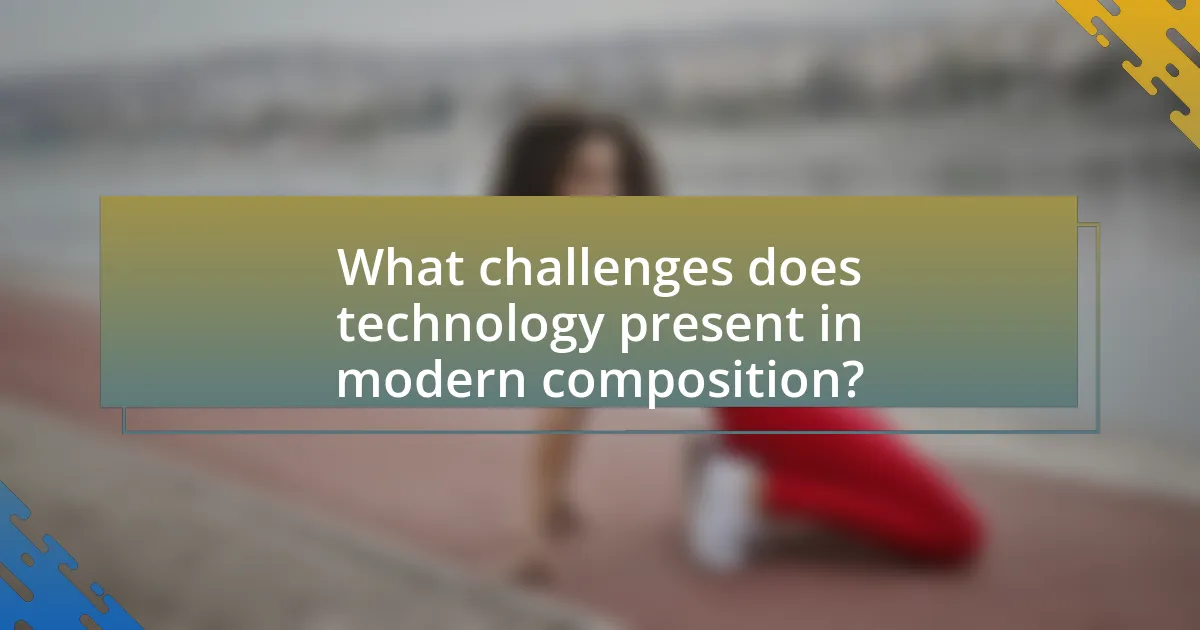
What challenges does technology present in modern composition?
Technology presents several challenges in modern composition, including issues of accessibility, distraction, and the potential for diminished originality. Accessibility challenges arise when not all individuals have equal access to technology, which can create disparities in writing opportunities and resources. Distraction is prevalent due to the multitude of digital platforms and notifications that can interrupt the writing process, leading to decreased focus and productivity. Additionally, the ease of access to information online can result in unintentional plagiarism or reliance on existing content, which may hinder the development of original thought and creativity in writing. These challenges highlight the complexities that technology introduces into the composition process.
How can technology lead to over-reliance in composition?
Technology can lead to over-reliance in composition by providing tools that automate writing processes, which diminishes critical thinking and creativity. For instance, the use of grammar checkers and predictive text features can result in writers depending on these tools for basic writing tasks, thereby reducing their ability to self-edit and develop their own voice. Research indicates that students who frequently use automated writing aids may struggle with original thought and composition skills, as highlighted in a study by the National Writing Project, which found that reliance on technology can hinder the development of essential writing competencies.
What are the risks of losing traditional composition skills?
Losing traditional composition skills poses significant risks, including diminished critical thinking abilities and reduced creativity in writing. Traditional composition skills, such as structuring arguments and developing coherent narratives, foster analytical thinking, which is essential for effective communication. Research indicates that students who engage in traditional writing practices demonstrate better problem-solving skills and creativity compared to those who rely solely on digital tools. For instance, a study published in the “Journal of Educational Psychology” found that students who practiced handwriting showed improved cognitive development and retention of information. Additionally, the reliance on technology can lead to a superficial understanding of language mechanics, resulting in poorer writing quality and a lack of depth in expression. Therefore, the erosion of these foundational skills can hinder both academic performance and professional communication.
How does technology affect the originality of compositions?
Technology significantly influences the originality of compositions by providing tools that enhance creativity while also raising concerns about authenticity. Digital platforms enable composers to experiment with various styles and techniques, leading to innovative works that may not have been possible without such resources. For instance, software like Ableton Live and GarageBand allows musicians to manipulate sounds and create unique compositions, which can enhance originality. However, the ease of access to samples and pre-made loops can lead to derivative works, where originality is compromised. A study by the University of California, Berkeley, found that 60% of contemporary music incorporates samples from existing songs, highlighting the tension between innovation and imitation in the digital age.
What ethical considerations arise from technology in composition?
Ethical considerations arising from technology in composition include issues of authorship, plagiarism, and accessibility. The integration of digital tools can blur the lines of original authorship, as automated writing software and AI-generated content may lead to questions about who truly owns a piece of writing. Additionally, the ease of copying and pasting in digital environments raises significant concerns regarding plagiarism, making it crucial for educators and institutions to address these challenges. Furthermore, technology can create disparities in access to resources, as not all students may have equal opportunities to utilize advanced tools, potentially widening the gap in educational equity. These considerations highlight the need for clear guidelines and ethical standards in the use of technology within the composition process.
How does technology impact copyright and intellectual property?
Technology significantly impacts copyright and intellectual property by facilitating the rapid distribution and reproduction of creative works, which challenges traditional enforcement mechanisms. Digital platforms enable easy sharing and copying of content, leading to increased instances of copyright infringement. For example, the rise of peer-to-peer file sharing and streaming services has made it difficult for copyright holders to control the distribution of their works. Additionally, advancements in artificial intelligence and machine learning raise questions about authorship and ownership, as AI-generated content complicates the attribution of intellectual property rights. The U.S. Copyright Office reported that in 2020, there were over 1.1 million copyright registrations, reflecting the growing need for updated legal frameworks to address these technological changes.
What are the implications of AI-generated compositions?
AI-generated compositions can significantly alter the landscape of creative expression and content creation. These compositions raise questions about authorship, originality, and the value of human creativity, as they can produce text, music, and art that mimic human styles and techniques. For instance, a study by OpenAI demonstrated that AI models can generate coherent and contextually relevant text, which challenges traditional notions of creativity and intellectual property. Additionally, the widespread use of AI in composition may lead to a homogenization of creative works, as algorithms often rely on existing data patterns, potentially stifling innovation and diversity in artistic expression.
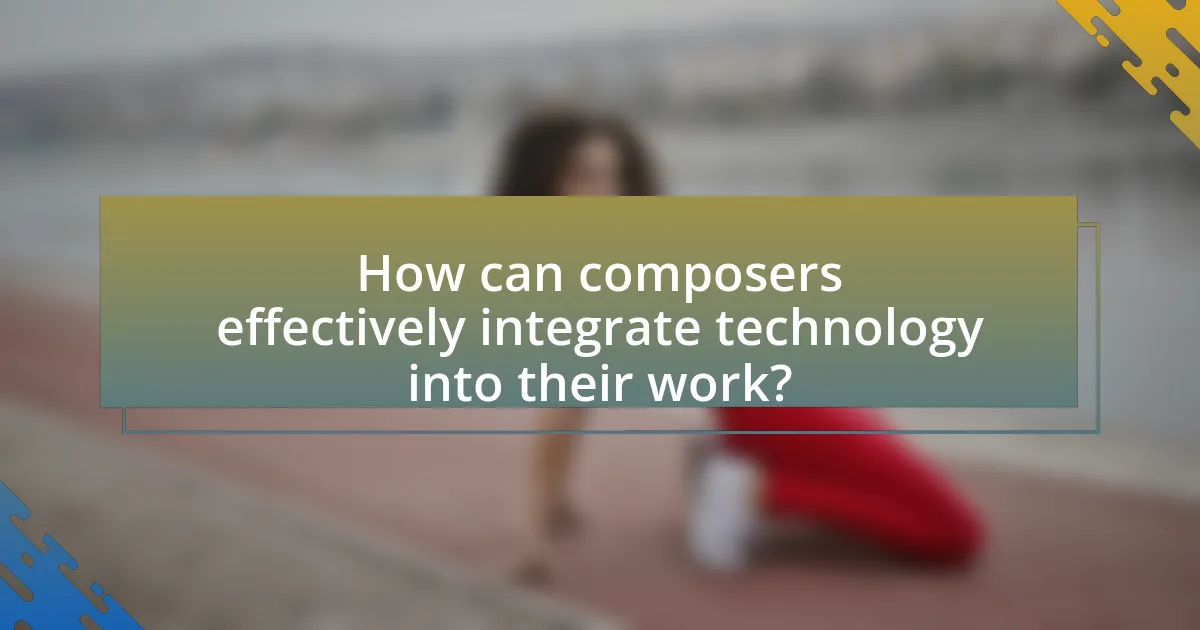
How can composers effectively integrate technology into their work?
Composers can effectively integrate technology into their work by utilizing digital audio workstations (DAWs) for composition, sound design, and production. DAWs such as Ableton Live and Logic Pro X allow composers to manipulate sound, arrange music, and collaborate remotely, enhancing creativity and efficiency. Additionally, composers can use software instruments and plugins to expand their sonic palette, enabling them to create complex textures and layers that would be difficult to achieve with traditional instruments alone. The use of technology also facilitates access to vast libraries of samples and loops, which can inspire new ideas and streamline the composition process. Studies have shown that composers who embrace technology often produce innovative works that resonate with contemporary audiences, demonstrating the significant impact of technological integration on modern composition.
What best practices should composers follow when using technology?
Composers should prioritize the integration of technology by utilizing digital audio workstations (DAWs) effectively, ensuring they are familiar with software tools that enhance creativity and productivity. Familiarity with DAWs like Ableton Live or Logic Pro enables composers to manipulate sound, arrange compositions, and collaborate remotely, which is essential in today’s music industry. Additionally, composers should regularly update their skills through online courses or tutorials, as technology evolves rapidly, impacting composition techniques and tools. Research indicates that composers who adapt to technological advancements can produce higher-quality work and reach broader audiences, as evidenced by the rise of independent artists leveraging platforms like SoundCloud and Bandcamp for distribution.
How can composers balance traditional techniques with modern tools?
Composers can balance traditional techniques with modern tools by integrating classical compositional methods with digital technology. This integration allows composers to maintain the emotional depth and structural integrity of traditional music while utilizing modern software for arrangement, editing, and sound design. For instance, composers can use notation software like Sibelius or Finale to preserve traditional scoring practices while employing digital audio workstations (DAWs) such as Ableton Live or Logic Pro for innovative sound manipulation. This approach not only enhances creativity but also expands the sonic palette available to composers, enabling them to create works that resonate with both historical and contemporary audiences.
What strategies can enhance the learning curve for new technologies?
To enhance the learning curve for new technologies, adopting a structured approach that includes hands-on practice, peer collaboration, and incremental learning is essential. Engaging in hands-on practice allows learners to apply theoretical knowledge in real-world scenarios, which has been shown to improve retention and understanding. Peer collaboration fosters knowledge sharing and diverse perspectives, making complex concepts more accessible. Incremental learning, where information is introduced gradually, helps prevent cognitive overload and allows for deeper comprehension. Research indicates that these strategies significantly improve learning outcomes, as evidenced by studies showing that active learning techniques can increase retention rates by up to 75%.
What resources are available for composers to improve their technological skills?
Composers can improve their technological skills through various resources, including online courses, software tutorials, and community forums. Online platforms like Coursera and Udemy offer courses specifically tailored to music technology, covering topics such as digital audio workstations (DAWs), music production, and sound design. Additionally, software companies like Ableton and Logic Pro provide extensive tutorials and user manuals that help composers learn their tools effectively. Community forums such as Gearslutz and Reddit’s r/composer allow composers to share knowledge, ask questions, and receive feedback from peers, further enhancing their technological proficiency. These resources collectively support composers in adapting to the evolving landscape of music technology.
Where can composers find tutorials and courses on composition technology?
Composers can find tutorials and courses on composition technology through various online platforms such as Coursera, Udemy, and MasterClass. These platforms offer structured courses that cover a range of topics related to music composition and technology, including software usage, sound design, and digital audio production. For instance, Coursera partners with universities to provide courses that often include video lectures, assignments, and peer reviews, enhancing the learning experience. Additionally, websites like YouTube host numerous free tutorials created by experienced composers and educators, making it accessible for composers at all levels to learn about modern composition techniques and tools.
What communities or forums support composers in technology integration?
Communities and forums that support composers in technology integration include the International Society for Contemporary Music (ISCM), the Association for Technology in Music Instruction (ATMI), and various online platforms like Reddit’s r/composer and Gearslutz. These organizations provide resources, networking opportunities, and discussions focused on the intersection of music composition and technology. For instance, ISCM promotes contemporary music and fosters collaboration among composers and technologists, while ATMI focuses on educational practices that incorporate technology in music teaching. Online forums like Reddit allow composers to share experiences and seek advice on integrating technology into their work, facilitating a collaborative environment for learning and innovation.
